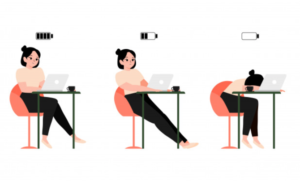
As a college student, it is easy to be influenced by the competitiveness among your peers all over the country. This is a never-ending cycle of comparing yourself to others, overloading your schedule to keep up or get ahead, and falling into an unmotivated and tired state. The overall idea of being busy in college is glorified and masked as being successful, but in reality, it is only deteriorating the mental, emotional and physical health of college students as they struggle to manage a million and one things.
Working part-time jobs, applying for competitive internships, being actively involved in numerous organizations, volunteering, applying for scholarships and excelling in their full-time academic coursework — while also making time for a social life — are all a part of a college student’s overwhelming schedule. This hectic calendar with little room for breaks comes with a price — burnout.
Student burnout is defined as “a state of emotional, mental, and physical exhaustion that is caused by excessive and prolonged stress,” by Florida National University. Burnout usually happens when you are feeling overwhelmed and unable to satisfy endless demands. As this feeling continues, students can fall down a path of unmotivated disinterest to complete everything they have signed up for as their mind is desperately asking for a break.
Signs of burnout fall into three categories: mental, physical, and emotional. Mental signs include careless mistakes, releasing frustrations on others, losing confidence and lacking critical thinking and problem-solving abilities. Physical signs are in forms of exhaustion, pain, tension, headaches, dizziness and over-thinking. Last, but certainly not least, emotional signs included increased sensitivity to minor issues and criticism, lack of concentration during leisure activities and a consistent feeling of being uninterested in prior hobbies.
All these signs are caused by the student feeling constant levels of high stress and anxiety for long periods of time. Many students are barely able to fit in adequate amounts of sleep, healthy eating habits and essential personal time because they are caught up in being the “busiest.”
According to Harvard.edu, a 2018 survey found that 63% of college students felt “overwhelming anxiety” and 23% were “diagnosed or treated by a mental health professional for anxiety in the past year.”
The study named sleep disruption from excessive usage of caffeine and all-nighters, school stress and disengagement from studies and loneliness as factors that increase the risk for anxiety and stress among students.
Sleep disruption, or lack of sleep, has caused way too many students to jeopardize their health, moods, grades and safety to remain in the running for the “busiest student award.” The University of Georgia supports this claim by stating that college students sleep for about 6-6.9 hours a night. This is an insufficient amount of sleep and leads to students overextending themselves to finish everything with 110% effort on coffee and a nap.
I personally know burnout all too well as I felt like I was not doing enough to make myself more marketable to future employers during this past summer. This lack of confidence led me to believe a tight schedule managing two internships, 12 credits, organizations, and student leadership this semester would fix this self-developed problem. With that being said, moderate depression, very high levels of anxiety, and a high level of stress were the results of my wellness assessment from Florida A&M University’s self-counseling app, Well Track.
I do regret taking on more responsibilities than I could handle in order to “keep up with the Joneses,” but I will say this experience involved well-needed professional development and forced me to reflect on myself more often. I do not think that I could ignore my overworked mind, tired physical being and unhealthy emotional state ever again.
Overwhelming yourself does not mean you are on the path to success because you are leaving out the most important part — inner peace and happiness. I plan to get help to take back control of my life and I hope other students do, too.